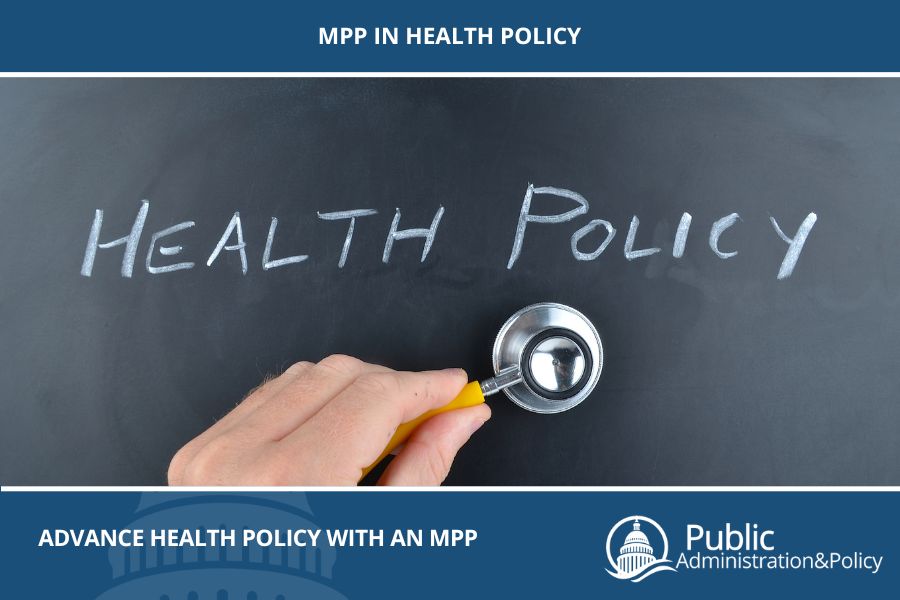MPP in Health Policy
Advancing Health Equity Through Public Policy Education
A Master of Public Policy (MPP) in Health Policy equips students with the skills to address critical challenges in healthcare systems and improve public health outcomes through strategic policymaking, research, and analysis. This graduate degree program is ideal for individuals passionate about shaping policies that impact healthcare equity, access, and quality at local, national, and global levels.
Designed for full-time and part-time students, the program emphasizes practical applications through coursework, case studies, and program evaluation. Students gain expertise in public health management, health policy analysis, and strategic decision-making, preparing them for leadership roles in government agencies, nonprofit organizations, and the private sector.

Table of Contents
Who Should Pursue a Master of Public Policy in Health Policy?
An MPP in Health Policy is tailored for individuals eager to influence healthcare systems and drive public health reforms. It is ideal for:
- Public Health Advocates: Professionals passionate about improving public health outcomes and addressing disparities.
- Healthcare Policy Analysts: Individuals who want to evaluate, design, and implement policies in public and private sectors.
- Student Enrolled in Dual Programs: Those pursuing joint degree programs like an MPP and MPH in Health Policy and Management.
- Public Health Professionals: Those seeking to enhance their public health practice and management skills through advanced policy training.
Pros and Cons of an MPP in Health Policy
| Pros | Cons |
|---|---|
| Provides specialized training in public health management and policy. | May require additional certifications, such as an MPH degree. |
| Opens career opportunities in the public health program sector and beyond. | Limited focus on non-health-related policy areas. |
| Equips students with advanced coursework and practical skills for leadership roles. | Some career paths may require experience in public health practice. |
This program is an excellent fit for those who want to make a meaningful impact in health care systems and public health policy.
Admissions Requirements
Admissions criteria for an MPP in Health Policy include:
- Bachelor’s Degree: From an accredited institution, preferably in public health, political science, or a related field.
- GPA Requirements: A minimum GPA of 3.0 is typically required, though competitive programs may prefer higher.
- Letters of Recommendation: Two to three references from academic or professional contacts, including faculty members familiar with your work.
- Personal Statement: A document outlining your interest in health policy and how it aligns with your career goals.
- Résumé or CV: Highlighting relevant experience in public health management or related fields.
- Financial Aid Applications: Completing the FAFSA and exploring scholarships or grants specific to health policy.
Please note: Some schools may offer concurrent degree programs, allowing students to combine the MPP with an MPH degree or similar qualifications in public health program management. This option is ideal for students who want an interdisciplinary education to excel in public policy and health leadership.
Online MPP in Health Policy Curriculum
The MPP in Health Policy course requirements combine foundational public policy training with specialized electives and practical experiences. Most programs require 36–48 credit hours, including a capstone project or thesis.
Core Courses
Students complete essential courses in health policy and public management, such as:
- Foundations of Public Policy and Healthcare Governance
- Health Economics and Financing
- Quantitative Skills for Health Policy Analysis
- Ethics in Public Health and Policy
- Program Evaluation for Health Systems
Elective Courses
Electives allow students to tailor their studies to specific areas of interest, such as:
- Global Health Policy and Development
- Long-Term Care Policy for Aging Populations
- Addressing Health Disparities in Vulnerable Populations
- Healthcare Technology and Innovation Policy
- Behavioral Health Policy
Capstone Project
A capstone project allows students to apply their knowledge to real-world healthcare policy challenges. Examples include:
- Evaluating the success of federal healthcare initiatives such as Medicaid expansion.
- Designing policies to increase access to mental health care in underserved communities.
- Developing cost-effective strategies to improve healthcare delivery in rural areas.
These projects help students demonstrate their ability to address public health management challenges with evidence-based solutions.
What Careers Can You Pursue with an MPP in Health Policy?
Graduates of an MPP in Health Policy are prepared for leadership roles across various sectors. Popular career paths include:
- Healthcare Policy Analyst: Researches and evaluates policies impacting healthcare systems and public health outcomes.
- Public Health Advisor: Design and implement health initiatives with governments or nonprofits.
- Program Evaluator: Assesses the effectiveness of public health programs and recommends improvements.
- Health Policy Consultant: Advises organizations on compliance, strategic planning, and system improvements.
- Legislative Analyst: Assists lawmakers in drafting and advocating for health-related legislation.
These roles often require a blend of coursework, practical experience, and policy expertise developed through this program.
Why Choose an MPP in Health Policy?
The Master of Public Policy in Health Policy offers a unique opportunity to address critical healthcare policy and public health challenges.
Key Benefits
- Specialized Knowledge: Focuses on healthcare governance, financing, and policy analysis.
- Career Opportunities: Graduates are prepared for roles in healthcare systems, government agencies, and international organizations.
- Practical Application: Includes program evaluation, case studies, and capstone projects to tackle real-world health challenges.
- Joint Degree Programs: Many schools offer dual degree programs, such as an MPP combined with an MPH in Health Policy and Management.
- Financial Aid Options: Most programs provide scholarships, assistantships, and grants to support students.
This program equips graduates with the professional skills to influence healthcare systems and drive meaningful change in public health policy.
Sources
- NASPAA. “Accreditation Standards for Public Policy Programs.” https://www.naspaa.org
- U.S. News & World Report. “Best Online MPP Programs.” https://www.usnews.com
- Bureau of Labor Statistics (BLS). “Occupational Outlook Handbook: Healthcare Policy Careers.” https://www.bls.gov
Acknowledgment
This guide provides an overview of the MPP in Health Policy, offering insights into the curriculum, admissions requirements, and career opportunities for students committed to improving healthcare systems and public health outcomes.